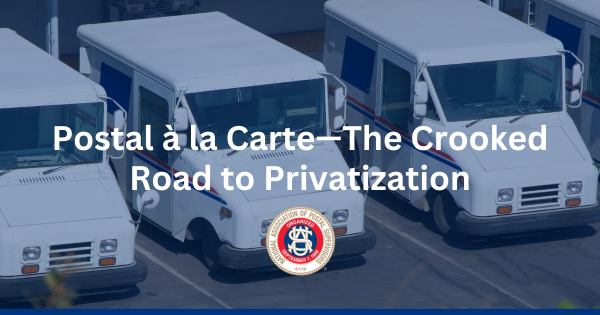Postal à la Carte—The Crooked Road to Privatization
Postal à la Carte—The Crooked Road to Privatization
By Bob Levi
NAPS Director of Legislative & Political Affairs
The city is Americana, USA. It’s a city of about 1 million citizens. Many live in city-center apartments, others live in modest detached houses and a few live in exclusive, gated communities.
Law enforcement and crime protection are provided by Americana’s police force, an essential service to which all the city’s citizens are entitled. Local taxes finance Americana’s police department. However, the gated community hired its own private-security guards to patrol its confines to deter crime.
Those residents want tax rebates equivalent to the funds Americana would have had to expend on patrolling their gated community, but did not because of the private security. Nevertheless, Americana’s uniformed and well-trained police officers still would be required to arrest lawbreakers and transport them to the city jail—even in the gated community.
Such a financial arrangement between Americana and residents of the exclusive community would reduce the city’s law enforcement budget and undermine police protection for the non-gated areas of Americana. It also would strain the specific police services still provided in the gated community.
Ever since the 1970s, the U.S. Postal Service extended to certain mailers “work-sharing” discounts and special arrangements intended to boost mail volume. These postal discounts and arrangements spawned a new industry within the postal economy that has displaced a significant portion of the Postal Service’s mail processing operation.
The financial incentive to detour mail away from the bulk of postal operations appears to have hampered operational efficiencies and deterred and delayed the Postal Service from developing and implementing breakthrough and home-grown mail technologies. Some of these technologies have been advanced by private mail operators.
Private operators have gone into coding, sorting and mail consolida-tion. As a result, mail is being entered into the mail stream late in the postal operation, dodging almost everything but “last-mile delivery”—the most-expensive and labor-intensive component of the mail operation.
The ultimate impact of these actions inevitably will lead to a privatized Postal Service, as the discounts and continued mail volume decline will not provide the necessary revenue to sustain the expansive and essential universal network that defines our Postal Service. Those who will suffer most will be those who need the Postal Service most.
Americans continue to treasure universal, affordable and accessible governmental mail service. Therefore, some statements made at a summer-time congressional hearing were troubling. The comments suggested a degree of tolerance in privatizing distinct postal functions.
The “cover story” is expanding “postal-private partnerships”—commercial relationships to move more postal functions into the private sector. Retail sales and box services, transportation and mail processing are the most vulnerable to postal outsourcing. However, delivery is not immune to privatization.
Amazon and Walmart are seeking to expand their last-mile delivery capabilities, even in rural areas. For example, this past April, Amazon announced its plans to invest approximately $4 billion to build out a rural delivery network. This endeavor not only provides a platform for the delivery of Amazon-sold products, but also has implications for the Amazon Marketplace and postal revenue earned from small businesses currently using the Postal Service.
These small enterprises may be incentivized to move to the Amazon delivery network. It is important to note that the Postal Service’s decision to degrade delivery standards, particularly in rural areas, may play an important role in mailer decisions over which provider will deliver the agency’s products. However, it is equally important to point out that only the Postal Service provides delivery service at least six days a week.
Over the past few years, the Postal Service has made significant capital investments to upgrade its processing technology and expand its logistics capabilities, including insourcing more mail transportation and modernizing its delivery fleet. Clearly, private mail operators feel threatened by the Postal Service’s efforts to insource more of its functions and reclaim the traditional postal operations that have been appropriated by the private sector.
These investments would be squandered and efficiencies voided should the Postal Service be compelled by White House demands, congressional pressure and/or special-interest legislation to surrender postal functions to private-sector competitors. Moreover, revenue generated through insourcing would vanish.
Whether by wholesale privatization, piecemeal dismantling or another federal agency assuming control, the Postal Service and its employees continue to be under assault.
NAPS is working with senators serving on the Homeland Security and Governmental Affairs Committee, the panel tasked with conducting confirmation hearings on presidential nominees to the Postal Service Board of Governors, to examine the views on the future of the agency. Currently, there are four vacancies on the board.
As NAPS leads the way in questioning many misguided efforts to privatize or dismantle the Postal Service, we continue to evaluate the degree to which emerging legislation, nominations or regulations promote postal abandonment. Excessive postage discounts divert much-needed postal revenue to the private sector.
Such revenue reductions impair universal service and undermine uniform postage rates. Attempts to outsource retail functions and processing operations threaten mail security and postal efficiency.
NAPS will continue to remind the White House, Congress and the mailing community that the Postal Service still provides the most efficient, affordable, reliable and universal delivery operation in the world, backed by a highly dedicated and patriotic workforce. Picking apart the Postal Service function-by-function is a recipe for disaster.
